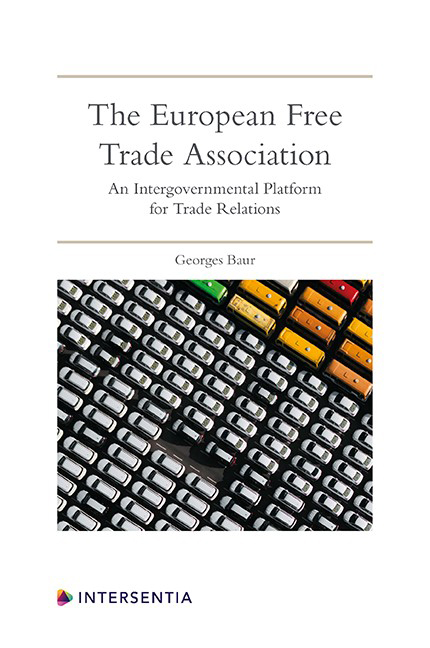Book contents
- Frontmatter
- Foreword
- Preface
- Acknowledgements
- Contents
- List of Tables and Figures
- Chapter 1 What is EFTA?
- Chapter 2 Short Historical Overview
- Chapter 3 Substantive Fields of Activity of EFTA
- Chapter 4 EFTA Institutions, Membership, Scope and Other General Provisions
- Chapter 5 Trade Relations with Third Countries and Groups of Countries
- Chapter 6 The Relations between the EFTA States and the EU/EEA
- Chapter 7 Conclusion: EFTA Membership for the UK Post-Brexit?
- Convention Establishing the European Free Trade Association
- Annex K. Free Movement of Persons (Chapter VIII)
- Annex T. Arbitration (Art. 48)
- Index
- About the Author
- Frontmatter
- Foreword
- Preface
- Acknowledgements
- Contents
- List of Tables and Figures
- Chapter 1 What is EFTA?
- Chapter 2 Short Historical Overview
- Chapter 3 Substantive Fields of Activity of EFTA
- Chapter 4 EFTA Institutions, Membership, Scope and Other General Provisions
- Chapter 5 Trade Relations with Third Countries and Groups of Countries
- Chapter 6 The Relations between the EFTA States and the EU/EEA
- Chapter 7 Conclusion: EFTA Membership for the UK Post-Brexit?
- Convention Establishing the European Free Trade Association
- Annex K. Free Movement of Persons (Chapter VIII)
- Annex T. Arbitration (Art. 48)
- Index
- About the Author
Summary
AIM OF BOOK AND DEFINITIONS
This short book aims to give the reader interested in European integration beyond the dimension of mere EU membership an insight into an alternative structure that has long been overlooked and ignored. If some knew of it, then it was considered by many an outdated model and, to put it bluntly, a loose association of some economically highly specialised, small and wealthy Western European states. However, the European Free Trade Association (EFTA) was once conceived as an alternative model under the United Kingdom's leadership to the then European Economic Community (EEC), now European Union (EU).
The lost interest in EFTA can also be shown by the (academic) writing undertaken on that subject. In the early days there were quite noteworthy publications on EFTA and the economic policy it represented. Interest in the subject diminished when the UK joined the EEC. There was, however, still some academic literature produced on EFTA, notably on the free trade agreements between the EU and the EFTA states, although not much in English. Then, after the inception of the European Economic Area (EEA), the interest of academia remained with that form of European integration, if at all. Most of the academic contributions dealing with EFTA either came from the EFTA Secretariat or the EFTA states themselves, or these were needed as an introduction to the EEA. One unfortunate consequence of this is ‘that the political scientists [and other academics, G.B.], who see the “European Integration” as a synonymous with the history of the EU and its current performance, lose many opportunities for comparative research’.
As shown by a quick look at the press, interest in EFTA has increased since the referendum of 23 June 2016, in which a slim majority of UK voters expressed their wish to leave the European Union. Since the very beginning of the reporting on the so-called ‘Brexit’, hardly any distinction has been made between EFTA and the EEA.
In this book, various aspects related to EFTA will be examined in greater detail. Brexit will serve as an opportunity to introduce the subject, and there will be a chapter dealing with the question whether EFTA could be of interest to the United Kingdom (UK) when it acquires its new status outside the EU.
- Type
- Chapter
- Information
- The European Free Trade AssociationAn Intergovernmental Platform for Trade Relations, pp. vii - xPublisher: IntersentiaPrint publication year: 2020



